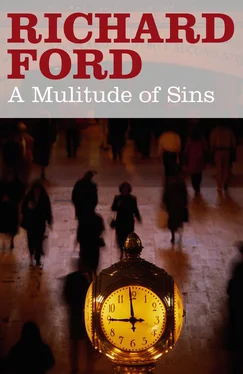For a while Nancy sat in the stiff naugahyde chair beside a table lamp, and leafed through the magazines previous guests had left in the nightstand drawer: a Sailing with an article on the London-to-Cape-Town race; a Marie Claire with several bar graphs about ovarian cancer’s relation to alcohol use; a Hustler in which an amateur artist-guest had drawn inky moustaches on the girls and little arrows toward their crotches with bubble messages that said Evil lurks here , and Members Only , and Stay with your unit . Naughty nautical types with fibroids, she thought, pushing the magazines back in the drawer.
There was another copy of the same Pennysaver they’d read at breakfast. She looked at more of the “Down-East In Search Of”s. Come North to meet mature Presque Isle, cuddly n/s, sjf, cutie pie. Likes contradancing and midnight boat rides, skinny dipping in the cold, clean ocean. Possibilities unlimited for the right sjm, n/s between 45 and 55 with clean med record. Only serious responses desired. No flip-flops or Canucks plz. English only . Touching, she thought, this generalized sense of the possible, of what lay out there waiting. What, though, was a lonely sjf doing in Maine? And what could a flip-flop be that made them so unlikeable? Cuddly, she assumed, meant fat.
She wished to think about very few things for a while now. On the drive across from Belfast she’d become angry and acted angry. Said little. Then, when Tom was in the office paying for the room while she waited in the car, she’d suddenly become completely un- angry, though Tom hadn’t noticed when he came back with the key. Which was why he’d gone to sleep — as if his sleep were her sleep, and when he woke up everything would be fixed. Peaceful moments, of course, were never unwelcome. And it was good not to complicate life before you absolutely had to. All Tom’s questing may simply have to do with a post facto fear of retirement — another “reaction”—and in a while, if she didn’t exacerbate matters, he’d forget it. Life was full of serious but meaningless conversations.
On the silent TV a golf match was under way; elsewhere a movie featuring a young, smooth-cheeked Clark Gable; elsewhere an African documentary with tawny, emaciated lions sprawled in long brown grass, dozing after an offstage kill. The TV cast pleasant watery light on Tom. Soon oceans of wildebeests began vigorously drowning in a muddy, swollen river. It was peaceful in the silence — even with all the drownings — as if what one heard rather than what one saw caused all the problems.
Just outside the window she could hear a child’s laughing voice and a man’s patient, deeper one attempting to speak some form of encouragement. She inched back the heavy plastic curtain and against the sharp rays of daylight looked out at the motel lawn, where a large, thick-bodied young man in a silver wheelchair, wearing a red athletic singlet and white cotton shorts — his legs thick, strong, tanned and hairy as his back — was attempting to hoist into flight a festive orange-paper kite, using a small fishing rod and line, while a laughing little blond girl held the kite above her head. Breeze gently rattled the kite’s paper, on which had been painted a smiling oriental face. The man in the wheelchair kept saying, “Okay, run now, run,” so that the little girl, who seemed perfectly seven, jumped suddenly, playfully one way and then another, the kite held high, until she had leaped and boosted it up and off her fingers, while the man jerked the rod and tried to winch the smiling face into the wind. Each time, though, the kite drooped and lightly settled back onto the grass that grew all the way down to the shore. And each time the man said, his voice rising at the end of his phrases, “Okay now. Up she goes again. We can do this. Pick it up and try it again.” The little girl kept laughing. She wore tiny pink shorts and a bright-green top, and was barefoot and brown-legged. She seemed ecstatic.
He was the man from the park in town, Nancy thought, letting the curtain close. A coincidence of no importance. She looked at Tom asleep in his clothes, breathing noiselessly, hands clasped on his chest like a dead man’s, his bare, brown legs crossed at the ankles in an absurdly casual attitude, his blue running shoes resting one against the other. In peaceful sleep his handsome, unshaved features seemed ordinary.
She changed the channel and watched a ball game. The Cubs versus a team whose aqua uniforms she didn’t recognize. Her father had been a Cubs fan. They’d considered themselves northsiders. They’d traveled to Wrigley on warm autumn afternoons like this one. He would remove her from school on a trumped-up excuse, buy seats on the first-base line and let her keep score with a stubby blue pencil. The sixties, those were. She made an effort to remember the players’ names, using their blue-and-white uniforms and the viny outfield wall as fillips to memory thirty years on. She could think of smiling Ernie Banks, and a white man named Ron something, and a tall sad-faced high-waisted black man from Canada who pitched well but later got into some kind of police trouble and cried about it on TV. It was too little to remember.
Though the attempt at memory made her feel better — more settled in the same singular, getting-on-with-it way that standing on the sunny street corner being misidentified by a busload of Japanese tourists had made her feel: as if she was especially credible when seen without the benefit of circumstance and the encumbrances of love, residues of decisions made long, long ago. More credible, certainly, than she was here now, trapped in East Whatever, Maine, with a wayward husband on his way down the road, and suffering spiritual congestion no amount of life-by-forecast or authentic marriage could cure.
This whole trip — in which Tom championed some preposterous idea for the sole purpose of having her reject it so he could then do what he wanted to anyway — made her feel unkind toward her husband. Made him seem stupid and childish. Made him seem inauthentic. Not a grownup. It was a bad sign, she thought, to find yourself the adult, whereas your lifelong love-interest was suddenly an overexuberant child passing himself off as an enthusiast whose great enthusiasm you just can’t share. Since what it meant was that in all probability life with Tom Marshall was over. And not in the way her clients at the public defender’s saw things to their conclusions — using as their messenger-agents whiskey bottles, broom handles, car bumpers, firearms, sharp instruments, flammables, the meaty portion of a fist. There, news broke vividly, suddenly, the lights always harsh and grainy, the volume turned up, doors flung open for all to see. (Her job was to bring their affairs back into quieter, more sensible orbits so all could be understood, felt, suffered more exquisitely.)
For her and for Tom, basically decent people, the course would be different. Her impulse was to help. His was to try and then try harder. His perfidy was enthusiasm. Her indifference was patience. But eventually all the enthusiasm would be used up, all the patience. Possibilities would diminish. Life would cease to be an open, flat plain upon which you walked with a chosen other, and become instead cluttered, impassable. Tom had said it: life became a confinement in which everything got in everything else’s way. And what you finally sought became not a new, clearer path, but a way out. Their own son no doubt foresaw life that way, as something that should be easy. Though it seemed peculiar — now that he was away — to think they even had a son. She and Tom seemed more like each other’s parents.
But, best just to advance now toward what she wanted, even if it didn’t include Tom, even if she didn’t know how to want what didn’t include Tom. And even if it meant she was the kind of person who did things, said things, then rethought, even regretted their consequences later. Tom wasn’t, after all, trying to improve life for her, no matter what he thought. Only his. And there was no use talking people out of things that improved their lives. He had wishes. He had fears. He was a good-enough man. Life shouldn’t be always trying, trying, trying. You should live most of it without trying so hard. He would agree that was authentic.
Читать дальше












